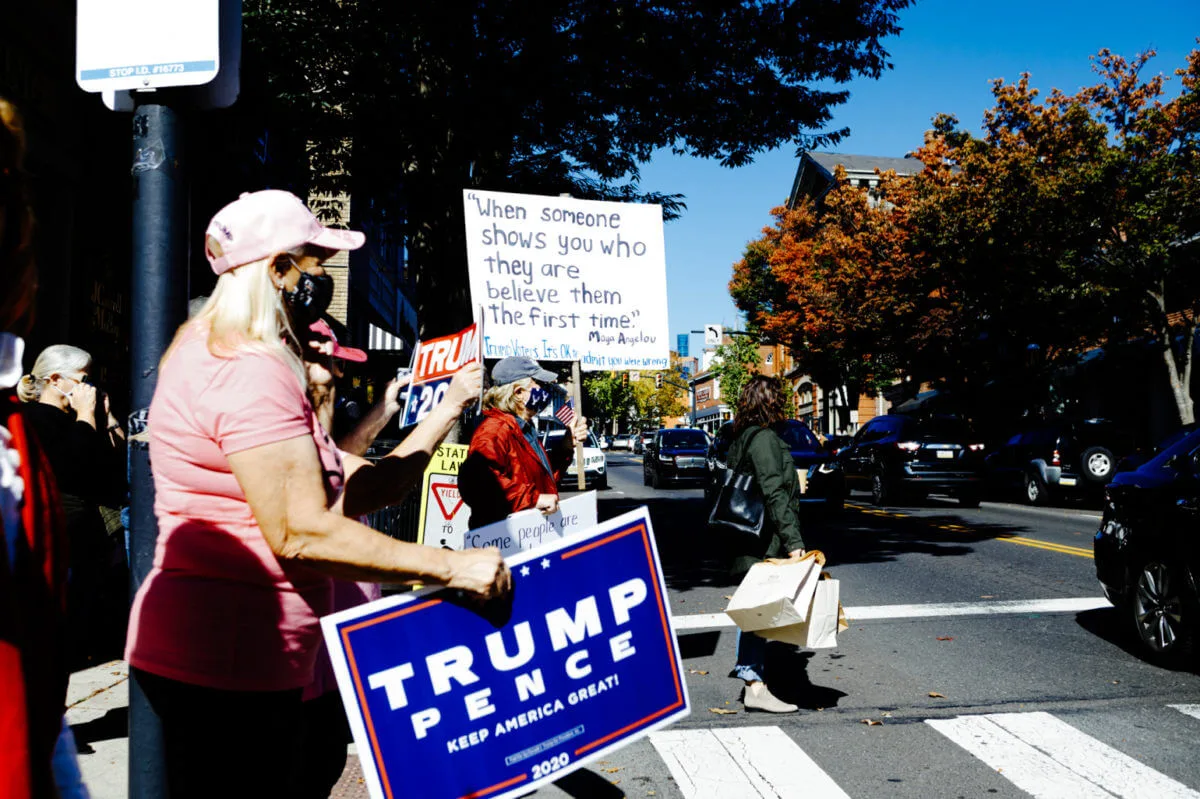
Joe Biden supporters, including a woman carrying a sign telling Donald Trump supporters "it's OK to admit you were wrong," and Trump supporters meet on Oct. 17, 2020, in downtown Doylestown, Bucks County. The two groups had gathered in the center of town to greet or protest a vehicle parade of Trump supporters. (Photo courtesy of Mike Maney)
Pennsylvania is poised to be the “tipping point state” that decides the 2020 election thanks to its politically diverse nature, but a result could take days, if not weeks, due to state election laws.
In 2016, Pennsylvania played a pivotal role in electing President Donald Trump, as a plurality of voters in the state decided to send a Republican to the White House for the first time in 28 years.
Four years later, the state is once again poised to play a decisive role and is considered by many election experts to be the “tipping point state,” or the state that pushes Trump or Democratic nominee Joe Biden across the 270-electoral vote threshold needed for victory. In fact, according to election analysis website FiveThirtyEight, there is a 30% chance that Pennsylvania delivers the decisive vote in the Electoral College. Wisconsin, which also helped elect Trump in 2016, is the next most likely tipping point state, at only 13%.
Both campaigns have honed in on Pennsylvania as a huge factor, with Biden choosing Philadelphia as the home of his campaign headquarters. The former vice president has also visited the state at least 15 times over the course of the campaign and frequently cites his upbringing in Scranton while on the campaign trail. Trump has also made nearly a dozen visits to the state.
So why is Pennsylvania so critical to the election outcome? What makes the state so competitive? And what can Pennsylvania residents expect on election night and the days following?
Let’s take a look.
Why is Pennsylvania So Important This Year?
To win the presidency, a candidate needs to reach 270 electoral votes. In any given election year, only a handful of states—and their electoral votes—are truly up for grabs.
States like California, Illinois, New York, and Washington are locks for Democrats, while large swaths of the South and Great Plains are Republican strongholds.
That leaves only about a dozen states that are competitive, and an even smaller number that have large numbers of electoral votes and are true toss-ups. In 2020, Arizona, Florida, Michigan, North Carolina, Pennsylvania, and Wisconsin fall into that category. Polls in all six states show Biden ahead, but with narrow leads that fall within the range of a statistical tie in Arizona, Florida, and North Carolina.
Trump could realistically hold all three of those states, which he won in 2016. Biden’s lead in Michigan (8 points) is also larger than his leads in Wisconsin and Pennsylvania (about 5 points), meaning Biden is more likely to win Michigan. And since Pennsylvania has twice as many electoral college votes (20) as Wisconsin (10), it’s taken on outsized importance and is viewed by experts as being more likely to provide the decisive electoral college votes.
What Makes Pennsylvania So Competitive?
Pennsylvania is one of the nation’s most politically competitive states. It is one of only eight states with a senator from each party and it is the only state with an equal number of Democrats and Republicans in the US House of Representatives (9 from each party). The state has also alternated electing Democratic and Republican governors dating back to the 1960s.
Registered Democrats outnumber Republicans in the state, 4.2 million to 3.5 million, but that gap has narrowed in recent years and nearly 1.3 million voters remain unaffiliated with either party.
RELATED: Pennsylvania Just Broke Its Voter Registration Record
While many other states have seen population booms in recent decades, Pennsylvania’s has remained reasonably stable, growing by only 1.5 million over the past 60 years. Still, a lot has changed over that time. The once-Democratic rural regions of the state have become far more conservative in recent years, while the suburbs of Philadelphia and Pittsburgh have grown less Republican and joined their urban centers as being Democratic strongholds.
The urban-rural political divide, which has played out in states across the country, is especially pronounced in Pennsylvania, where the gleaming skyscrapers and densely packed row houses of Philadelphia feel a world apart from the farms of Central Pennsylvania and coal mines of Western Pennsylvania.
Consequently, the political priorities of Pennsylvanians vary widely. While issues like tightening gun safety laws, addressing environmental racism, and racial inequality are huge issues in Philadelphia, they are afterthoughts in some parts of the state, where voters appear more concerned about avoiding government regulations, keeping taxes low, and maintaining gun rights.
This political polarization and the vast differences across the state have made Pennsylvania a true toss-up. Experts are predicting record turnout in 2020 and 1.7 million Pennsylvanians have already cast their ballots as of Monday afternoon, according to the US Elections Project. In doing so, they could play the decisive role in determining who the next president of the United States is.
What Should Pennsylvanians Expect on Election Day and Night?
While many of Pennsylvania’s 9 million registered voters will have already cast their votes in person or by mail before Election Day, it is extremely likely that the state won’t be able to announce a winner for several days, if not weeks, because of election laws regulating mail-in ballots.
Pennsylvania is one of only a handful of states that does not allow election workers to begin processing ballots until Election Day. This means that they cannot begin opening ballot envelopes, removing secrecy envelopes, and verifying signatures for millions of ballots, let alone count them, until the morning of Nov. 3. While Gov. Tom Wolf and other Democrats tried to change the law to allow counties to begin processing ballots sooner, the Republican-led legislature has refused to cooperate, saying they would only change the law if Democrats agreed to ban ballot drop boxes and support other measures that Wolf has opposed.
RELATED: Republican Legislators Refuse to Work with Gov. Wolf on Election Legislation
Mail-in ballots can arrive until 5 p.m. on Friday, Nov. 6, and still be counted, as long as they are postmarked before the polls close at 8 p.m. on election night, though state Republicans are challenging that deadline.
State Republicans are appealing the decision extending the ballot deadline to the US Supreme Court for a second time, just days after the US Supreme Court upheld the Pennsylvania Supreme Court ruling in a 4-4 split. With Judge Amy Coney Barrett likely to be confirmed to the bench on Monday, the US Supreme Court could reverse course and strike down the late-arrival deadline.
In a state that went for Trump by only 44,000 votes in 2016, those delays could prevent a winner from being announced next week. Since Pennsylvania could also be the tipping point state, a delay in announcing the winner of the state could mean a delay in announcing the next president altogether.
A slow count could also open the door for a wave of challenges to the validity of many mail-in ballots, particularly by the Trump campaign, which has for months railed against mail-in voting and filed dozens of lawsuits to limit voting.
If the conservative US Supreme Court majority accepts the Republican appeal of the state ballot deadline or gets involved in other lawsuits regarding election results, it could cause mayhem reminiscent of the 2000 election. That year, the result hinged on Florida and the Supreme Court got involved, overruling a Florida Supreme Court decision ordering a recount. In its 5-4 decision in Bush v Gore, the US Supreme Court handed the election to Republican George W. Bush.
In 2020, Pennsylvania could play the role of Florida. Even if things don’t get that messy, it is likely that for the second time in as many elections, Pennsylvania will decide the presidency.

For Rep. Susan Wild, supporting PA families includes reproductive rights and much more
Rep. Susan Wild wants to be very clear with Pennsylvanians: Donald Trump is committed to taking away women’s reproductive freedom, but he is not...

School districts working with anti-LGBTQ groups can cost your kids’ schools millions
Parents across South Central Pennsylvania are worried about the potential financial impacts working with anti-LGBTQ groups may have on their school...

VIDEO: Trump distances himself from his anti-abortion views
Donald Trump appeared on WGAL on Tuesday and continued to distance himself from his anti-abortion views claiming that reproductive rights are now a...

VIDEO: Community pushback gets school board to rescind decision on denying gay actor’s visit
Cumberland Valley School Board offered a public apology and voted to reinstate Maulik Pancholy as a guest speaker a week after the board voted to...

VIDEO: Project 2025 brings nuclear armageddon back into vogue
Project 2025 is a titanic document, with plans ranging from cutting half of all government employees to targeting reproductive rights on a scale...




